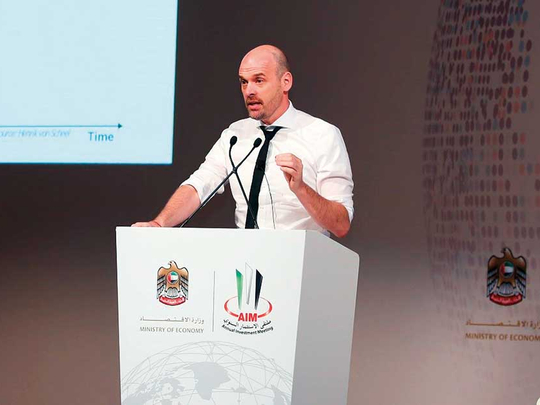
Dubai: The so-called ‘father of the Fourth Industrial Revolution’, Henrik Von Scheel, said on Tuesday that the UAE was at the centre of global innovation, noting heavy investment in the technologies of the future.
According to analysts, the Fourth Industrial Revolution, also known as Industry 4.0, is a collision of the virtual and physical worlds, connecting technological systems with analogue machines. These new systems will be fed by the massive amounts of data we produce every day, and will utilise the laptops, tablets and mobile phones already in circulation.
“When you really look at the real leaders of industry 4.0... that are really adding to it, it’s not China, it’s the country we are in right now,” Von Scheel said at the Annual Investment Meeting (AIM) taking place in Dubai.
According to the entrepreneur and venture capitalist, Industry 4.0 can be broken down in to two camps: manufacturing and services.
And while the UAE doesn’t have a strong manufacturing base, it is in services where the UAE is excelling, said Von Scheel.
“Services are where the UAE is willing to invest and try. For example, they have the biggest investment in blockchain here. They try and fail, because the UAE is willing to invest in 10 companies, and be OK with the fact that four will fail,” he said.
However, Von Scheel conceded that the revolution had indeed begun in Germany.
“But only because Germany focused on manufacturing to increase their GDP [gross domestic product], that’s why the epicentre for manufacturing, at least, is Germany,” he said.
The Fourth Industrial Revolution presented a “humongous opportunity” for the UAE, according to Von Scheel.
“I think that the Arabian Peninsula is at the pinnacle of really flowering again as a hub of innovation.”
Some key elements of Industry 4.0 include blockchain, artificial intelligence (AI), financial technology (fintech), robotics and predictive analytics. Experts say that the revolution will touch almost every facet of our lives, from how are goods are manufactured to how they are consumed.
“It’s a very, very big change,” Von Scheel said. “I just want to highlight that this is a huge opportunity for emerging markets.”
Experts have identified the Fourth Industrial Revolution as a chance for developing economies to leapfrog outdated technologies and propel themselves towards prosperity.
A commonly cited example is that of most nations across Africa, which installed wireless cell phone networks before most people ever had physical landlines, thus leapfrogging the antiquated technology and fuelling faster growth.
And whilst Industry 4.0 does present a chance for emerging economies to introduce more productive, secure, and efficient technologies, Von Scheel said, “the ability to capture it is another thing.”












